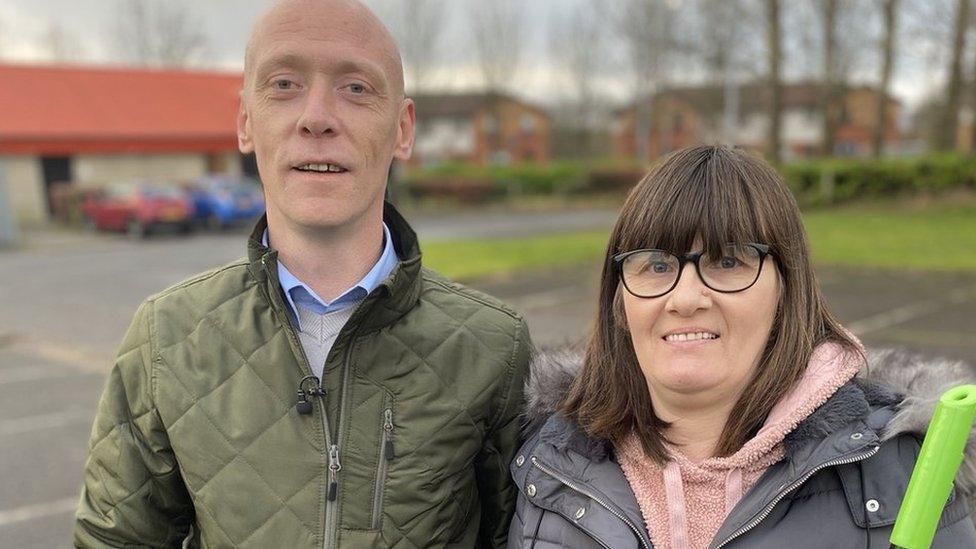Scotland's most and least deprived areas named
- Published
- comments
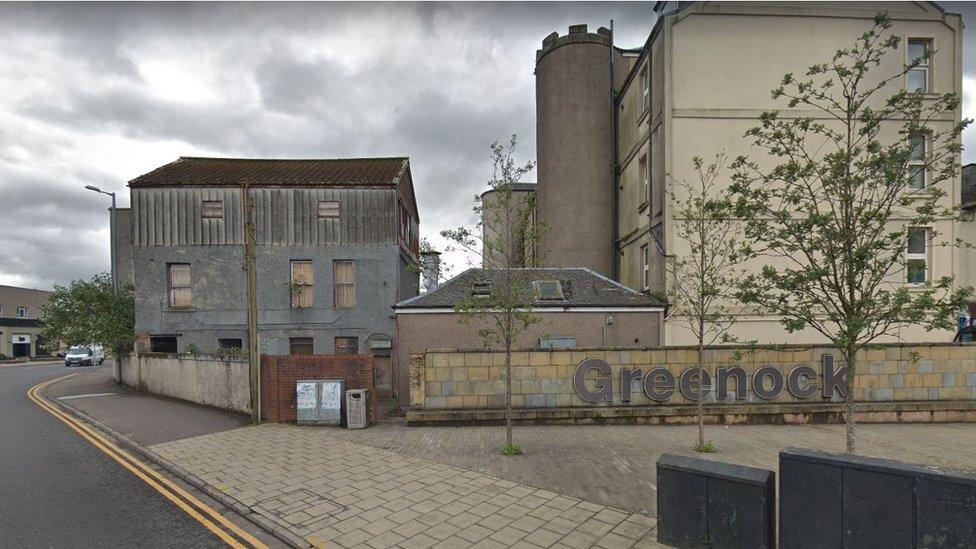
An area of Greenock, in Inverclyde, has been named as the most-deprived area
Parts of Greenock town centre have ranked highest for levels of deprivation in Scotland, according to official figures.
It sits at the top of the Scottish Index of Multiple Deprivation (SIMD), external - a measure considering seven criteria including income and health.
Ferguslie Park in Paisley was named as the most deprived area in the previous index, but this time was ranked third.
Stockbridge, in Edinburgh, has been named as having the least deprivation.
The findings, which are published by the Scottish government every four years, involve ranking 6,976 "datazones", effectively small postcode areas, across Scotland based on levels of income, employment, health, education, housing, access to services and crime.
Overall scores are then calculated for each datazone.
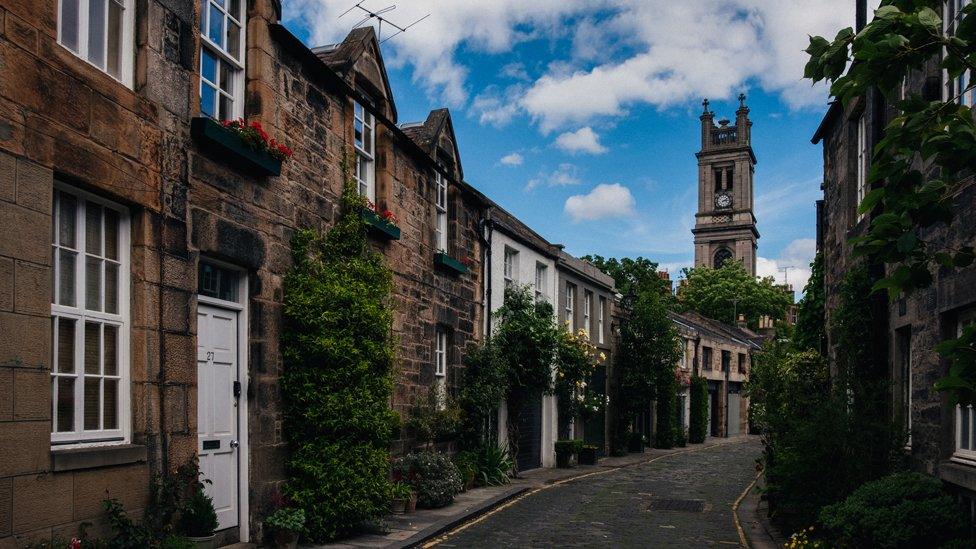
Stockbridge in Edinburgh has been named as the least-deprived area
Carntyne West and Haghill, in Glasgow, was the second most deprived.
It was followed by part of Ferguslie Park, which was named as the most deprived area in the previous two indexes. Another part of Ferguslie Park was also in the top 10 most-deprived areas.
The 10 most-deprived areas in Scotland:
Greenock Town Centre and East Central, Inverclyde
Carntyne West and Haghill, Glasgow City
Paisley Ferguslie, Renfrewshire (datazone S01012068)
Alloa South and East, Clackmannanshire
Buckhaven, Denbeath and Muiredge, Fife
Cliftonville, North Lanarkshire
Paisley Ferguslie, Renfrewshire (datazone S01012067)
Inverness Merkinch, Highland
Linlathen and Midcraigie, Dundee City
North Barlanark and Easterhouse South, Glasgow City
Edinburgh and Aberdeen each had four of the 10 areas with the least deprivation, with East Dunbartonshire and East Renfrewshire also having one area each in the 10 least-deprived areas.
The 10 least-deprived areas in Scotland:
Stockbridge, City of Edinburgh
West End North, Aberdeen City
Midstocket, Aberdeen City (datazone S01006559)
Marchmont West, City of Edinburgh
Midstocket, Aberdeen City (datazone S01006561)
Blackhall, City of Edinburgh
South Castlehill and Thorn, East Dunbartonshire
Morningside, City of Edinburgh
West End South, Aberdeen City
Netherlee, East Renfrewshire

Analysis by Chris Clements, BBC Scotland's social affairs correspondent
There were few surprises in the latest SIMD update. There will also be little surprise in Inverclyde as Greenock town centre fell from rank 23 to the most-deprived community in Scotland.
Why is this? It was the second-worst ranking area in terms of health outcome, mainly driven by its high number of drug-related hospital admissions.
It has among the lowest incomes and scores low on educational outcomes. Crime is also a driving factor.
Its high street is crumbling and is earmarked for £3m investment, external.
"Thing have changed dramatically over the last two years"
However, there is little to separate the "datazones" languishing in the bottom 20 in this year's update.
Like the rest, Greenock is a post-industrial town with high unemployment.
Elsewhere, Ferguslie Park in Paisley still suffers nearly 40 years after the closure of the Linwood car plant, while Craigneuk, which is in Wishaw in North Lanarkshire, overlooks the former site of Ravenscraig Steelworks.
This deprivation is set against a backdrop of limited local resources to invest in redevelopment.
Councils already face a combined funding gap of more than £1bn over the next three years, making the task of changing the fortunes of poorer communities all the more difficult.


The statisticians who put together the index say that "deprived" does not just mean "poor" or "low income".
It can also mean that people have fewer resources and opportunities, for example in health and education.
One area may score well on educational outcomes for example, but have poor health and access to services.
The most-deprived areas for each criteria:
Income - Falkirk town centre and Callendar Park
Employment - Glasgow's Shettleston north
Health - Glasgow's Possil Park
Education - Craigneuk, in Wishaw, North Lanarkshire
Access - Rannoch and Aberfeldy, in Perth and Kinross
Crime - South area of Glasgow city centre
Housing - Part of Strathbungo, on the south side of Glasgow
A separate report released on Tuesday by the Scottish government, external also highlighted the impact of deprivation in Scotland. It found that those living in the most deprived parts of the country are now four times more likely to die early than they were 20 years ago.
Responding to the SIMD research, Communities Secretary Aileen Campbell said more than £1.4bn had been invested in helping low-income households in 2018-19, with ministers also set to bring in the new £10-a-week Scottish Child Payment for poorer families from the end of 2020.
Ms Campbell said: "We are tackling the underlying causes of poverty... [and] we will continue to work in partnership with local government, the third sector and communities themselves to do all we can to tackle the causes of inequality and support the regeneration of our towns and cities."
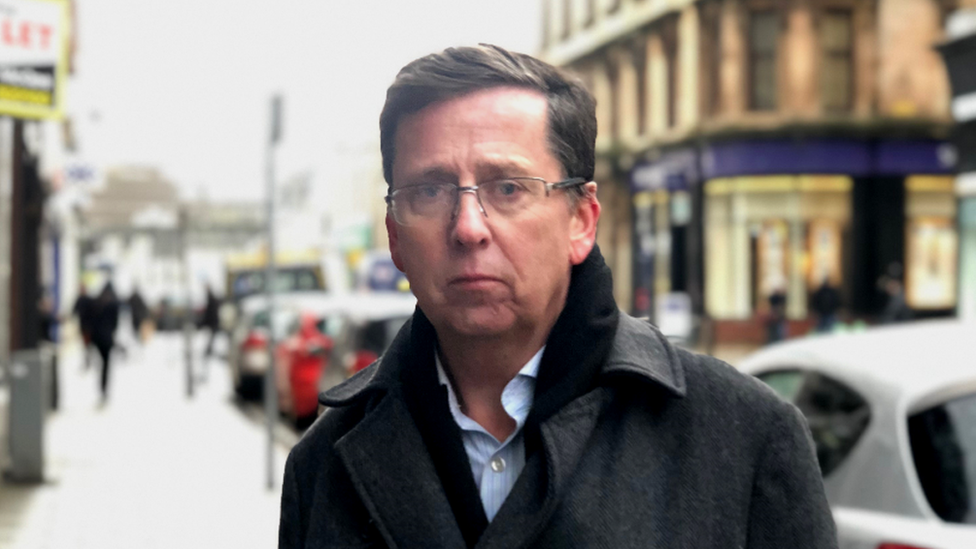
Councillor Jim Clocherty said no area wants to be labelled as 'most deprived'
Inverclyde Council's deputy leader, Councillor Jim Clocherty, said the label was "a bitter pill to swallow", adding that "investment can't come soon enough".
He said: "No part of Scotland wants to be labelled as the 'most deprived'.
"Greenock town centre has been earmarked for a £3m investment; right in the heart of this datazone for the redevelopment of its main shopping area at West Blackhall Street to boost the town centre and encourage more visitors.
"Within this datazone we have also secured investment to develop a new cruise visitor centre."
Deprivation levels in Scotland's cities
Maps produced by the Scottish Index of Multiple Deprivation, external highlight the differences between areas.
Those locations coloured dark red are in the most-deprived 10% in Scotland. Dark blue represents the least-deprived 10%.
The maps below show the colour of each data zone graded from dark red through orange to yellow, light blue and dark blue.
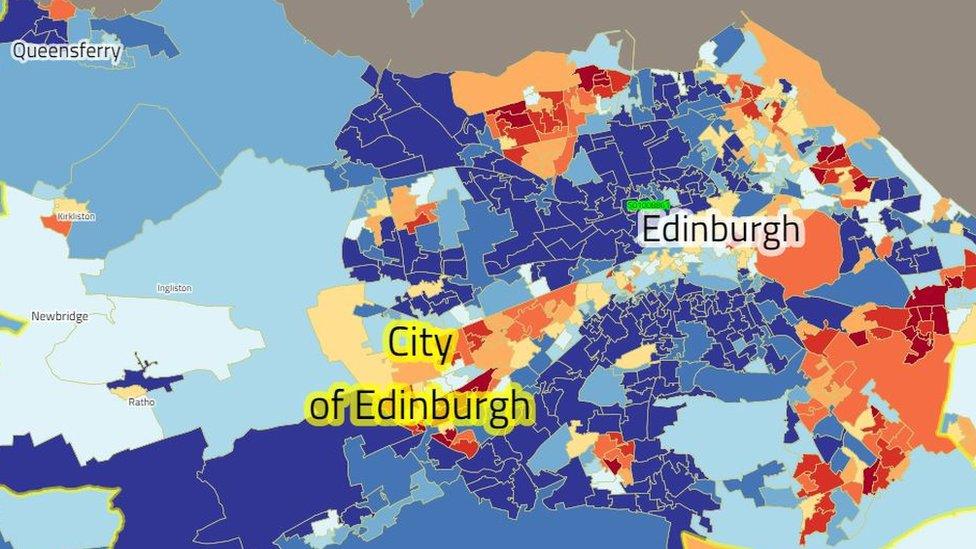
Dark blue is the least deprived 10% of Scotland, according to SIMD
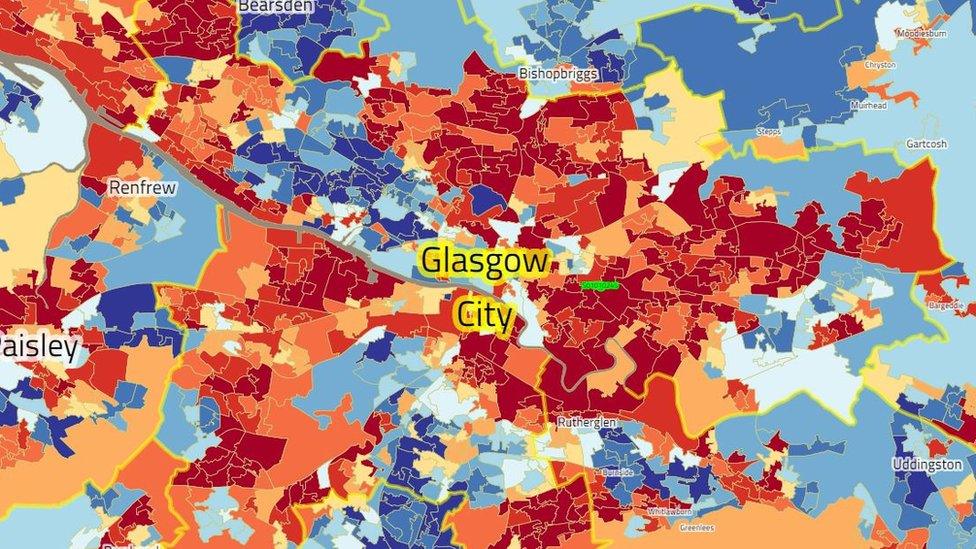
The dark red areas are the most-deprived and the dark blue are least deprived according to SIMD
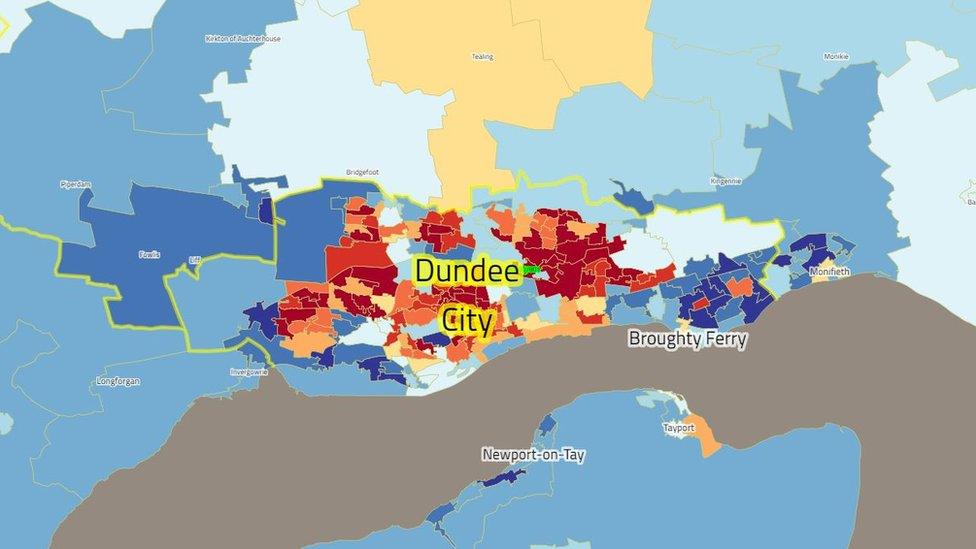
Dundee had one area in the 10 most-deprived parts of Scotland
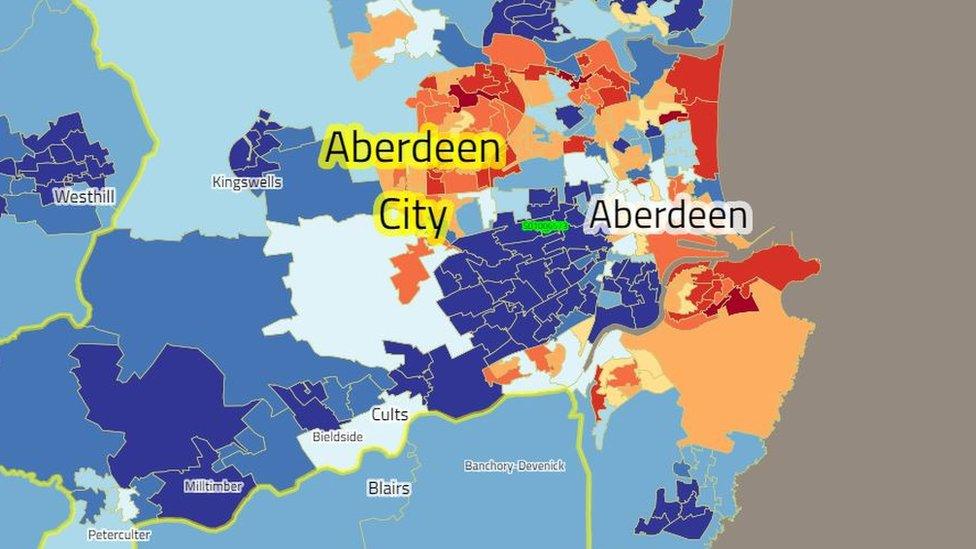
Aberdeen had four areas in the 10 least-deprived parts of Scotland
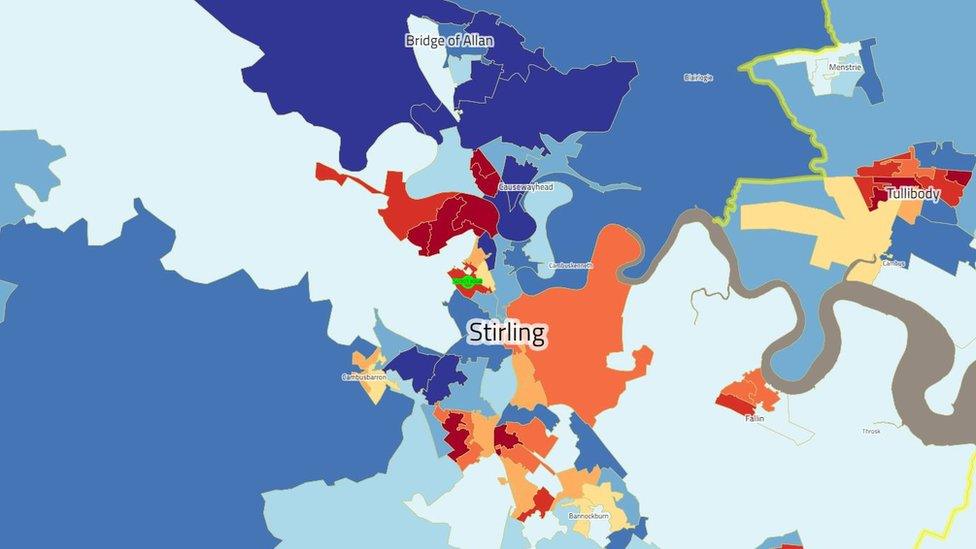
Stirling has very few just 12% of its council area in the most-deprived fifth of Scotland
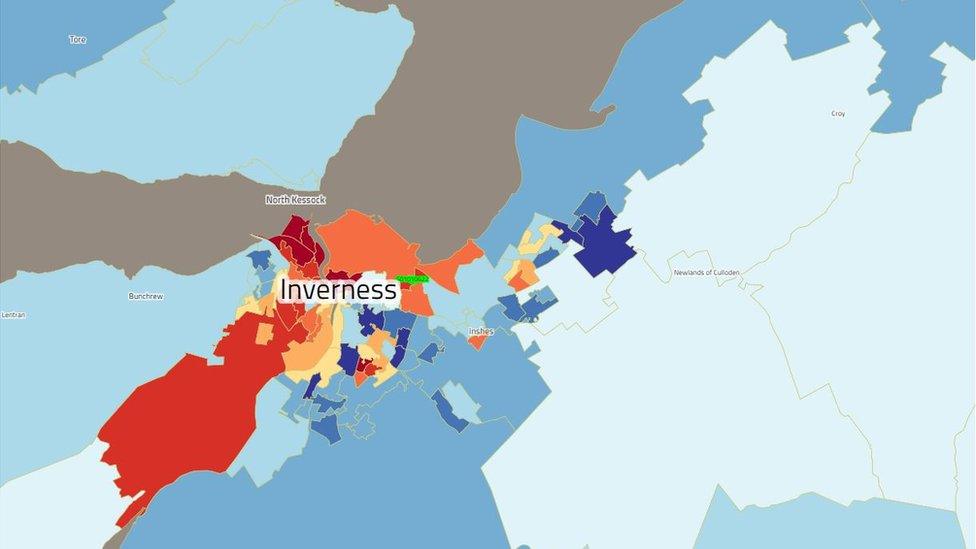
Inverness has some areas in the most-deprived 10% of Scotland
- Published27 January 2020
